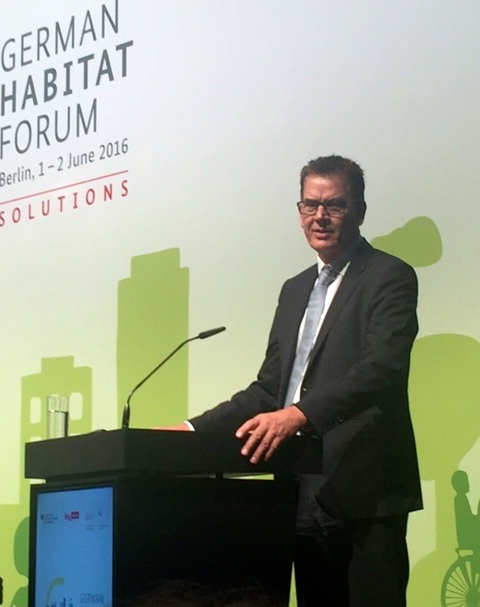
Migration to cities is not all positive, says German Development Minister
01 June 2016
by Richard Forster
Gerd Müller, Germany’s Federal Minister for Economic Cooperation and Development, yesterday welcomed delegates from over 80 countries to the German Habitat Forum, which is focusing on finding sustainable solutions to the challenges of urbanisation. Speaking at the formal opening of the event, which is taking place until end of today in Berlin, Müller said that countries and cities must bear in mind that the phenomenon of rapid urbanisation and migration from rural areas do not only bring positive change.
“Migration [to cities] is one of the biggest revolutions in the history of mankind—the sheer force of it is enormous—but it presents tremendous challenges as the development [it provokes] must be both sustainable and people-friendly,” said Müller. “This year’s Habitat III conference comes at a time when more than 55 percent of people are living in cities. We need to focus on human beings and their living conditions and where they work and live and making development people-friendly is one of the biggest tasks of our time.”
Cities can be engines of opportunity especially for young people but development needs to be inclusive and equitable.
“There is no other place where young people can have better access to education and the chance to rise socially,” added Müller. “But cities are breeding grounds for poverty and inequality as well as smog.”
Migration to cities is putting city services and systems of urban governance under extreme pressure. The solution according to Müller is to bring civil society into decision-making.
“They told us in Cairo which has some 30 million people that they almost do not have governance any more,” said Müller. “In many neighbourhoods, messages do not reach people so you have to work with civil society to see how to communicate messages and design neighbourhoods.”
The challenges of urbanisation are not simply a developing nation issue. Brussels, the capital of Europe, still not does treat all of its sewage.
“So let’s not be complacent, we should reach out to countries and help them deal with these challenges,” said Müller. “We need new partnerships and new ‘twinnings’ between municipalities and cities and I would like this conference to trigger that kind of partnership.”
Earlier, Michael Müller, the Governing Mayor of Berlin, had also raised the topic of governance observing that a top-down approach from rich to poor was unworkable. A key challenge for cities is facing up to migration not only from those seeking new opportunities but also from migrants escaping from conflict and war with some 90,000 such arrivals coming to Berlin.
“It is important to connect different neighbourhoods, and everything must be connected to different modes of transport including cycling and walking, so that people can get access to the services they need,” said the mayor.
The German Habitat Forum is intended to offer an opportunity to debate some of the issues framing the New Urban Agenda, which will be unveiled in Quito in October at the Habitat III meeting.









